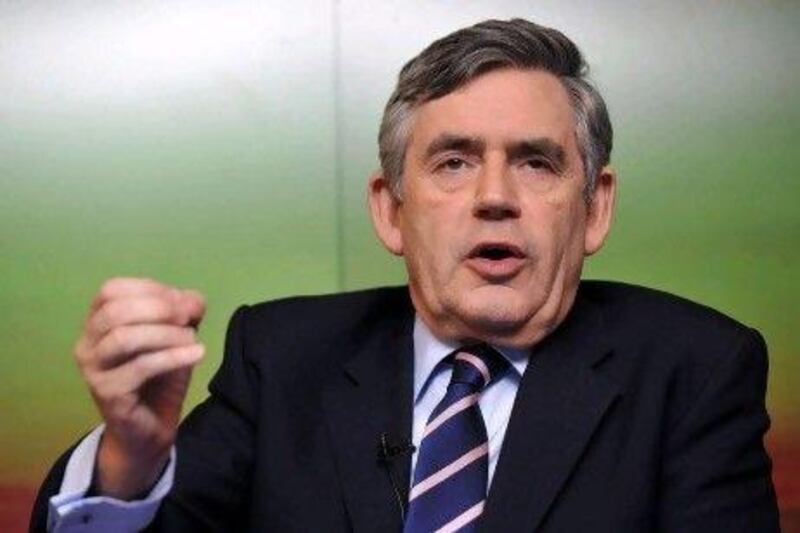Where does the world's economy go from here? Freed from the cares of statehood, Gordon Brown, the former British prime minister, gave a relaxed and humorous speech on Sunday night at an NYU Abu Dhabi Institute event at Manarat Al Saadiyat, but full of grave concern for the global economy. "We are at a time of momentous choice," he said. "Either we can cooperate or we can retreat into protectionism."
He pointed out there are already signs that some countries are reverting into their own borders. First Switzerland moved unilaterally to weaken its own currency, the Swiss franc. This was followed by India, Indonesia and Japan all taking steps to stop the inexorable strength of their own currencies. Brazil has imposed tariffs on imported cars, while in the US there are moves afoot to have China named as a currency manipulator for deliberately keeping the yuan weak to give it a competitive advantage in exporting.
"There is a new mood of mercantilism," he warned. "There is a growing concern about the direction the world is heading. At one IMF meeting I was struck by a banner that read: Worldwide Campaign Against Globalisation. You can understand what people were trying to say. In France in 2008 they said with even greater desperation: 'No to 2009'. We are seeing marchers in Spain, Brussels and now New York with demonstrations in Wall Street. The politicians have not done well in this crisis."
Mr Brown reminded the audience of the words of a predecessor, Sir Winston Churchill, who derided the inactivity of politicians after the Great Depression. "Churchill said that politicians were resolved to be irresolute, adamant for drift, solid for fluidity and all-powerful for impotence," he said.
Nor did Mr Brown think the bureaucrats behaved any better in that era. John Maynard Keynes, the great English economist, wrote a pamphlet entitled "How We Can Conquer Unemployment". The person in charge of the British Treasury wrote three words on the cover - "Inflation, extravagance, bankruptcy" - and had it filed away in the library.
Today, according to Mr Brown, there are three main problems in Europe, the epicentre of the crisis:
1. A banking crisis. Only in the past few weeks have people realised that Europe's banks are over-leveraged and under-capitalised. They are unable to lend. German banks are leveraged 32 times to their capital, French banks 28 times. In contrast, American banks have only lent 10 times their capital. They failed to recapitalise after 2008 and did not write off enough of their debts. Europe cannot return to growth if it doesn't solve its banking crisis.
2. A fiscal problem. This has occurred in Portugal, Ireland and Spain due partly to the government bailouts of their banking sectors.
3. Not enough growth. Europe's share of the global economy is declining. It used to be 30 per cent and now it is about 18 per cent. It is not able to sell enough to emerging markets. And all this must be solved within the euro. The US has been able to pump money into the system, as has the Bank of England. Only the European Central Bank could do this, but it is reluctant to do so. Euro-zone countries cannot devalue their currencies, as the UK has been able to do. Nor can euro-zone countries run a bigger deficit because that is not allowed under the rules.
The problem with the rest of the world is that they all have the same solution to the crisis: they all want to export their way out of difficulty.
"China, Turkey, Brazil and also the US want to export their way to success," said Mr Brown. "Not everybody can do this because somebody needs to be importing."
For Gordon Brown, the world is at a critical juncture. Ten years ago the US was the driver of the world economy; in 10 or 15 years' time it could be China and Asia. But now we are at a transition point.
How to solve this? The answer lies in global cooperation.
"We could all benefit from higher levels of growth. China and India should open their markets and agree to consume more. The US and Europe should cut their deficits and invest more in their infrastructures."
The setting for this great global agreement will be Cannes in the south of France at the beginning of next month, where the Group of 20 developed and emerging economies is due to convene. "The US has already retreated into its silo and is having an unhealthy preoccupation with either stimulus or cutting the deficit. It needs to take a longer view."
While Mr Brown was putting the case for greater global supervision and cooperation, Angela Merkel, the Germanchancellor, and Nicolas Sarkozy, the president of France, had a bilateral summit in Europe to agree to steps to resolve the euro-zone crisis. Details were sketchy, but they have set a deadline of the G20 meeting in Cannes for a solution, including sorting out Greece's debts and recapitalising the banks. Mr Brown's vision is optimistic, but a call for global financial supervision is likely to go the same way as the climate change talks: precisely nowhere. Expect the world's politicians to dither, ponder and procrastinate for a while yet. Cannes in November might prove to be interesting though, a "sunny place for shady people" as Somerset Maugham once described the Cote d'Azur. For once these shady people might be forced to make a decision.





